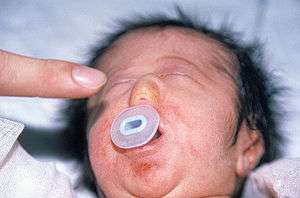Arrhinia
| Arrhinia | |
|---|---|
|
Neonate with partial arrhinia. | |
| Classification and external resources | |
| Specialty | medical genetics |
| ICD-10 | Q30.1 |
| ICD-9-CM | 748.1 |
| Orphanet | 1134 |
Arrhinia (/əˈrɪniə/ or /əˈraɪniə/; also called nasal agenesis) is the congenital partial or complete absence of the nose at birth. It is an extremely rare condition, with few reported cases in the history of modern medicine.[1] It is generally classified as a craniofacial abnormality.
Etymology
The word arrhinia derives from the Greek root rhinos (nose) prefixed with the Greek negation prefix a-.
Etiology
The cause of arrhinia is not known.[1][2] Akkuzu's study of the literature found that all cases had presented a normal antenatal history.[2]
Treatment
Treatment focuses on identifying the nature of the anomalies through various imaging methods, including MRI and CAT scan, and surgical correction to the extent possible.[2]
References
- 1 2 Albernaz, Vanessa; Mauricio Castillo; Suresh K. Mukherji; Ismail H. Ihmeidan (30 October 2005). "Congenital Arhinia" (PDF). American Journal of Neuroradiology. 17 (7): 1312–1314. PMID 8871717.
- 1 2 3 Akkuzu, Guzin; Babur Akkuzu; Erdinc Aydin; Murat Derbent; Levent Ozluoglu (20 September 2007). "Congenital partial arhinia: a case report". Journal of Medical Case Reports. 1 (1): 97. doi:10.1186/1752-1947-1-97.
External links
This article is issued from Wikipedia - version of the 11/29/2015. The text is available under the Creative Commons Attribution/Share Alike but additional terms may apply for the media files.
